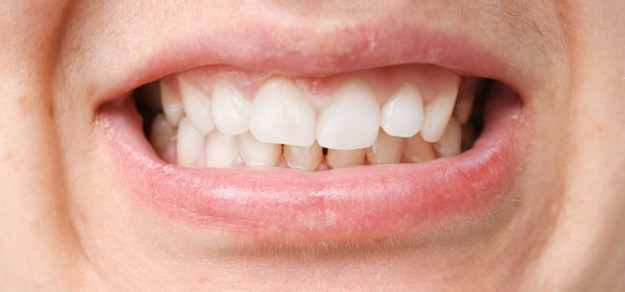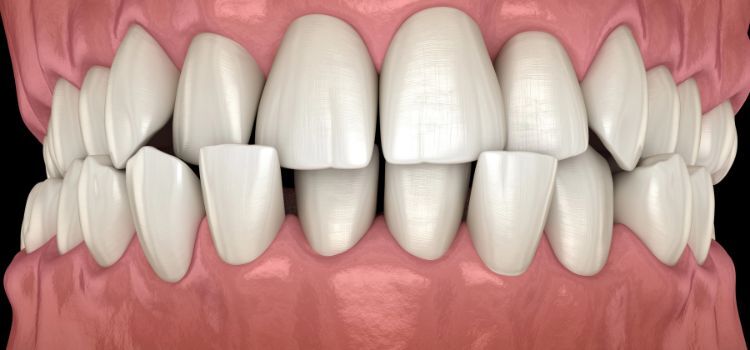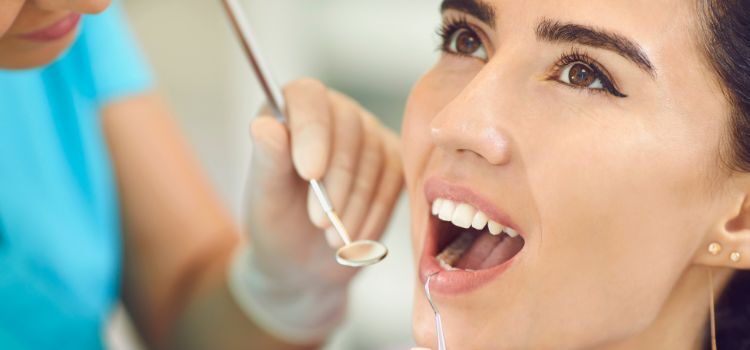Can a Misaligned Bite Cause Bruxism?
17th Sep 2025

Misaligned bite causing bruxism is a common concern, but the connection isn’t as clear as many think. While bite problems can put extra strain on your jaw and teeth, research shows they are not the main cause of teeth grinding.
Stress, anxiety, and sleep issues are more common reasons behind bruxism. Still, a bad bite can make symptoms like jaw pain and tooth wear worse.
In this article, you’ll learn how bite alignment affects bruxism, what signs to watch for, and how treatments like night guards can help protect your teeth.
Does Bite Alignment Affect Teeth Grinding?

A misaligned bite does not directly cause bruxism, but it can worsen its effects. Current research shows no proven link between bite alignment and the root cause of teeth grinding. However, bite problems can increase jaw strain and tooth wear. Stress, anxiety, and sleep disorders are the primary causes of bruxism.
For many years, dental professionals believed that bruxism was caused by bite problems, such as misaligned teeth or malocclusion. However, studies have not found clear evidence supporting this. Today, stress, anxiety, and behavioral factors are seen as the main reasons behind teeth grinding.
Note: while a misaligned bite can affect your oral health, treating bruxism requires a broader approach than bite correction alone.
Related Articles:
Misaligned Bite vs. Stress-Related Bruxism
Bruxism is often linked to stress, anxiety, and other behavioral factors, not just bite problems. While a misaligned bite can affect your teeth and jaw, current research shows it’s not the main cause of bruxism.
Misaligned Bite
- Can lead to uneven tooth wear, jaw strain, and discomfort. But it doesn’t directly cause teeth grinding.
Stress-Related Bruxism
- Emotional stress, anxiety, and sleep disorders are more common reasons why people grind or clench their teeth, especially at night.
- Research shows that stress is identified as a primary factor contributing to bruxism. Chronic stress can lead to changes in the central nervous system, affecting muscle activity in the jaw.
Note: Both issues can happen together. For example, stress might trigger grinding, while a bad bite can worsen its effects, causing more wear or pain.
Signs Your Bite Might Be Misaligned
Even if a misaligned bite doesn’t directly cause bruxism, it can still affect your oral health and comfort. Here are common signs your bite may be off:
Uneven Tooth Wear: Flat, chipped, or worn-down teeth from uneven contact.
Jaw Pain or Tension: Soreness, tightness, or fatigue in your jaw muscles.
Clicking or Popping Jaws: Sounds or sensations when opening or closing your mouth.
Frequent Headaches: Especially around the temples or jaw area.
Difficulty Chewing: Feeling like your teeth don’t fit right or food gets stuck.
Facial Pain: General discomfort around the face, jaw, or neck.
Note: If you notice these signs, it’s a good idea to have your bite checked by a dentist. While fixing bite alignment may not cure bruxism, it can improve comfort and prevent further tooth damage.
How Dentists Diagnose Bite-Related Bruxism

Dentists can check if your bite is contributing to bruxism symptoms, even if it’s not the main cause. Here’s how they do it:
1. Visual Exam
During a visual exam, the dentist checks for signs of tooth wear, chips, or cracks. They also examine how your teeth come together when you bite and chew.
2. Bite Analysis
During a bite analysis, dentists may use bite paper or digital scans to check if your teeth are coming into contact unevenly. They also assess whether your bite alignment is placing extra strain on your jaw.
3. Jaw and Muscle Check
During a jaw and muscle check, the dentist feels for any muscle tightness, tenderness, or unusual joint sounds in your jaw, such as clicking or popping.
4. Bruxism Signs
During the examination for bruxism signs, the dentist will ask if you experience morning jaw pain, frequent headaches, or if a partner has noticed you grinding your teeth during sleep.
Treatment Options for Bite-Related Bruxism
Even though a misaligned bite may not directly cause bruxism, treating bite issues can still help reduce discomfort and protect your teeth. Treatment often involves a combination of approaches to address both the bite alignment and the grinding itself.
Bite Correction
Bite correction treatments may involve using braces or clear aligners to fix teeth alignment. In some cases, dental restorations like crowns are used to help balance the bite.
Night Guards for Protection
Night guards for protection are custom-fitted to shield your teeth from grinding. They help reduce jaw pressure and prevent further damage to your teeth and jaw.
TMJ & Muscle Treatment
TMJ and muscle treatment may involve jaw exercises, physical therapy, or medication to relieve symptoms if the jaw joints are affected.
Stress Management
Stress management is often recommended because stress is a major cause of bruxism. Relaxation techniques or therapy can help reduce tension and minimize teeth grinding.
Note: In most cases, the best approach is protecting your teeth with a night guard while addressing bite issues and managing stress.

- Most Popular
- Hard Outside, Soft Inside
- 2MM Thick
- Moderate / Heavy

- Most Durable
- Hard Materials
- 1.5MM Thick
- Heavy / Severe

- For Day Time Use
- Thin, Barely Visible
- 1MM Thick
- Light / Moderate

- For Clenching
- Flexible & Soft
- 1.5MM Thick
- Light / Moderate
Related Articles:
- Guide to Choosing the Right Night Guard
- The Relationship Between Bruxism and Stress
- Can Night Guards Straighten Teeth?
When to See a Professional
If you grind your teeth or feel jaw discomfort, it’s best to see a dentist or orthodontist. Watch out for signs like constant grinding or clenching (especially at night), jaw pain or clicking, frequent headaches, worn or chipped teeth, and a bite that feels “off.”
Seeing a professional early can protect your teeth, ease pain, and prevent bigger jaw problems. They can recommend the right solution, like a night guard, bite correction, or TMJ treatment.
Conclusion
Bite problems don’t cause bruxism, but they can make it worse. Stress is often the main reason for grinding. Protecting your teeth is still important. Early treatment can stop damage, reduce pain, and keep your smile safe.
A custom night guard is an easy and effective way to protect your teeth. Worried about teeth grinding? Pro Teeth Guard offers custom night guards at an affordable price—made by the same labs as your dentist.
References:
- Manfredini, D., Winocur, E., Guarda-Nardini, L., Paesani, D., & Lobbezoo, F. (2012). Epidemiology of bruxism in adults: A systematic review of the literature. Journal of Oral Rehabilitation, 40(7), 490–502. https://doi.org/10.1111/j.1365-2842.2012.02298.x
- Pavlou, I. A., Spandidos, D. A., Zoumpourlis, V., & Papakosta, V. K. (2024). Neurobiology of bruxism: The impact of stress (Review). Biomedical Reports, 20(4), 59. https://doi.org/10.3892/br.2024.1747

- Most Popular
- Hard Outside, Soft Inside
- 2MM Thick
- Moderate / Heavy

- Most Durable
- Hard Materials
- 1.5MM Thick
- Heavy / Severe

- For Day Time Use
- Thin, Barely Visible
- 1MM Thick
- Light / Moderate

- For Clenching
- Flexible & Soft
- 1.5MM Thick
- Light / Moderate
